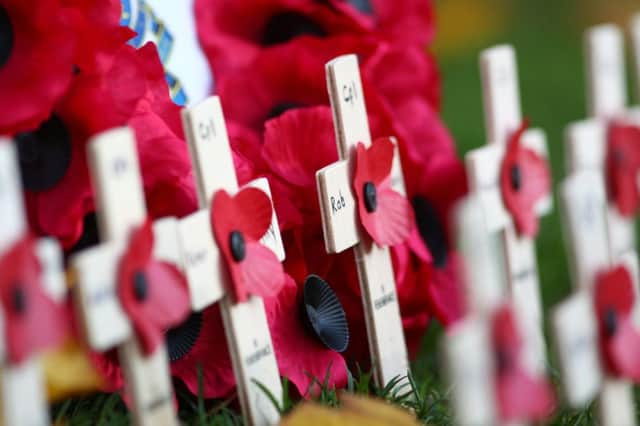Leaders: New generation says we will never forget


In Edinburgh’s St Giles Cathedral, Scottish Secretary Alistair Carmichael and First Minister Alex Salmond attended a service, while Deputy First Minister Nicola Sturgeon was in Glasgow for a ceremony in George Square.
On Saturday, and for several weeks previously, many paid their respects at the Tower of London, where 900,000 ceramic poppies had been planted as a spectacular memorial.
Advertisement
Hide AdAdvertisement
Hide AdAs the years went by, and the decades, there was a concern that, as the veterans of the 1914-18 war passed away and the parades of surviving veterans of the Second World War grew smaller, so too would the numbers of those attending remembrance services across the country. Many had also despaired that these dark periods in our history would be lost to the young and that the myriad acts of courage, endurance and sacrifice would be forgotten.
But today the acts of remembrance are as marked as ever – and certainly even more so this year. The memorial services are as relevant and respected as ever they were. And they have gained, not shrunk, in poignancy. The horrors of both wars, the numbing toll of those who fell and the damage, physical and psychological, inflicted on hundreds of thousands of survivors are marked in an unending catalogue of books, documentaries and films, as well as monuments in almost every town.
CONNECT WITH THE SCOTSMAN
• Subscribe to our daily newsletter (requires registration) and get the latest news, sport and business headlines delivered to your inbox every morning
The Remembrance Day services are not only firmly embedded in the national consciousness but they are also part and parcel of our continuing education. For an older generation they provide a collective occasion to remember and show respect. And for the children, grandchildren and great grandchildren of those with a direct connection to these conflicts they are able to learn for the first time about the atrocities of war, the sacrifice of our forebears on our behalf for our freedom and way of life – and how important it is to commemorate them, no matter how many years pass.
This year we are also marking the pull-out from Afghanistan, and those who fell during this campaign have also been remembered, including in Afghanistan where Prince Harry joined troops in Kandahar and laid a wreath.
Thus, while this may be a “special” year because of the anniversary, it does not signify that the need or desire for remembrance should diminish. Indeed, the evidence of recent years suggests the opposite. And the lesson that is brought home with this annual reminder could not be more valuable to young and old and indeed all throughout the UK. To those who fell in defence of our freedom and way of life, we will forever owe the greatest debt.
Learning before teaching
DIRE warnings of cuts in teacher numbers, accompanied by talk of more “asymmetric” weeks as secondary schools close down on Friday afternoons: council chiefs seem to be squaring up for a fight against further constraints in the Scottish Government’s education budget.
Such rhetoric might have greater resonance with the public were there not continuing concerns over the structure and governance of Scotland’s schools system and the effectiveness of the controversial Curriculum for Excellence in delivering academic improvement. Local councils will have £4.1 billion to spend on schools this financial year. This total has declined by just 5 per cent over the last three years – a sum that modest efficiency improvements should have been able to deliver. But there can be little doubt that Holyrood and local authorities face challenges ahead over future funding. However, against this background the Convention of Scottish Local Authorities (Cosla) has indicated an agreement with the government from next year that “should begin shifting the focus away from input measures such as teacher numbers towards a more useful measure of educational outcomes”.
Advertisement
Hide AdAdvertisement
Hide AdThis switch of focus to outcomes is overdue. For too long the health of Scotland’s education system has been judged more on the size of budget it consumes and the number of teachers it employs rather than on the educational attainment of pupils in its care. If it is indeed the case that we are moving to an outcomes-based assessment in schools, the constraints of budgets will have brought a welcome change. However, informed judgment must await the fine detail of this indicative shift.
SCOTSMAN TABLET AND IPHONE APPS